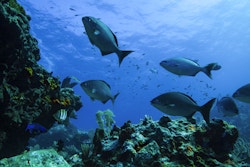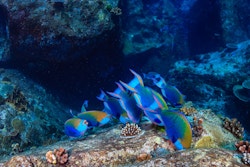Taking inspiration from nature: ecosystemic redundancy
“Our solutions are in nature”: the theme of the International Day for Biological Diversity 2020 has proven to be a particularly rich source of inspiration for our on-board scientist Katia Nicolet, a doctor of marine biology specialising in corals, who gives us the low-down on the founding notion of biodiversity on Earth: ecosystemic redundancy.
Biodiversity is the variety of species living in a given system
Coral reefs rank among the most bio-diverse ecosystems on the planet and they are a genuine oasis of life in a vast blue desert. Reefs make up less than one per cent of the world’s oceans, though they comprise more than 25% of all marine life.

Diving in the Caribbean Sea
Why is this biodiversity so important?
Every species plays a specific role in its ecosystem. Parrotfish, for example, feed on the small algae, which grow on the surface of the rock. By grazing on these algae, parrotfish enable the coral to develop on a substratum free of rivals. This ecosystemic role is essential for the survival of coral and, across a wider and more varied spectrum, the survival of coral reefs.

Diving in the Caribbean Sea
Parrotfish are not the only ones to take on this role. Indeed, they are assisted in their work by a host of herbivore species, like surgeon fish, rabbitfish and damselfish, as well certain invertebrates like sea urchins. This redundancy in terms of ecosystem provides a degree of resilience to the system as a whole. In our example, even if a parrotfish were to die out, its ecological role would be maintained by other protagonists presented above. This is what we refer to as ecosystemic redundancy.
Ecosystemic redundancy, a factor of resilience
This redundancy is extremely important in ensuring the sustainability of the coral reef, despite environmental changes and other more direct disturbances. It is this idea of supporting the system, which we refer to when we speak about resilience.
This resilience which results from biodiversity is a key aspect in any ecosystem, whether it’s terrestrial or marine, and man instinctively understands the need for redundancy in performing certain functions. For instance, it would be unthinkable to hit the road without a spare tyre.
The dangers of homogenisation and energy dependence
Despite this, today humanity is gravitating towards a homogenisation of the ‘human ecosystem’. In the space of 100 years, we’ve lost 90% of the crop varieties that provide us with our daily intake of food. Similarly, we’ve become overly dependent on just one energy source: oil. Today, this dependence on a finite energy supply poses major economic and social problems as well as exacerbating climatic issues caused by this consumption of fossil energy.

Energy Observer
“On Energy Observer, we take inspiration from the way the natural ecosystems work and for our own energy source we rely on a diverse range of renewable energies: the sun, the wind and water. This energetic and functional redundancy is something we need to learn from if we are to move towards a more resilient future.”